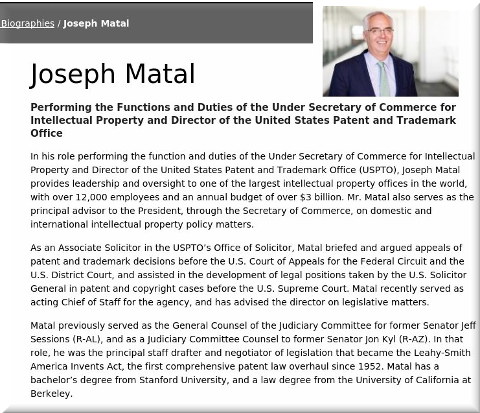Joseph Matal, who played a role in AIA, is in charge for the time being, but it's probably just temporary

Summary: The travesty of software patents, such as patents on multimedia compression and playback, may soon be made worse as patents on genome are being aggregated by a notorious patent aggressor
DOZENS of articles have been written here about
MPEG-LA, its owner, and its tactics. The entity is, simply put, more like a troll than a pool.
Now that the
EPO chooses to become the world's laughing stock for granting patents on CRISPR (even the
USPTO would not do that) MPEG-LA
prepares to impose predatory patent taxes on life itself. To quote IAM:
The end of June was the deadline to submit patents for inclusion in a potential new pool, organised by MPEG LA, that will focus on the CRISPR/Cas9 gene editing technology. MPEG LA is the administrator behind the wildly successful MPEG-2 video compression pool that launched 20 years ago.
Among those to submit their IP for possible inclusion in the pool was the Broad Institute, the research organisation that has been one of the CRISPR/Cas9 pioneers. Broad co-owns 22 relevant US and European assets along with MIT, Harvard and The Rockefeller University, and its decision to get involved is something of a coup for MPEG LA.
Why is MPEG-LA still around? As we noted here before, there were serious questions raised about its legitimacy. It's one heck of a racket! Having preyed on companies in jurisdictions where software patents aren't even valid, now they are hoping to do the same with genome. Incredible!
We have recently seen reports which suggest CRISPR patents make their way into the US, only
after Battistelli's EPO fell for that controversial trap/slippery slope (and the appeal boards are probably too severely weakened to stop this). This is a turning point and a critical crossroad. It serves to remind everyone of the dangers of the EPO under Battistelli.
Where will such patents go next? China? Japan? The JPO
seems to be focused on gender rather than actual patent policies (like scope) and now that the USPTO is without a Director (only
an interim one, Joseph Matal) it's important to keep an eye on what's happening there. The rest of the weekend will be dedicated purely to the USPTO. We have a lot to publish.
Yesterday,
Managing IP looked into the mind of Matal, the person who now heads (in the interim at least) the USPTO. From the portion that's not behind paywall:
In an open and wide-ranging speech at the Patents for Financial Services Summit in New York, interim USPTO director Joseph Matal predicted “we are going to win” the Oil States case, TC Heartland “is not going to put the venue issue to bed” and “there will be further patent reform legislation in the coming Congress”
What kind of reform does he refer to? The regressive steps proposed by the patent microcosm? We shall write about that in the coming days.
⬆

